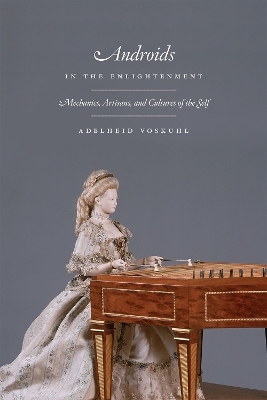
Androids in the Enlightenment – Mechanics, Artisans, and Cultures of the Self
Seiten
2015
University of Chicago Press (Verlag)
978-0-226-03416-4 (ISBN)
University of Chicago Press (Verlag)
978-0-226-03416-4 (ISBN)
The eighteenth century saw the creation of a number of remarkable mechanical androids. The author investigates two such automata - both depicting piano-playing women. She demonstrates that only in a later age of industrial factory production did mechanical androids instill the fear that societies had become indistinguishable from machines.
The eighteenth century saw the creation of a number of remarkable mechanical androids: at least ten prominent automata were built between 1735 and 1810 by clockmakers, court mechanics, and other artisans from France, Switzerland, Austria, and the German lands. Designed to perform sophisticated activities such as writing, drawing, or music making, these "Enlightenment automata" have attracted continuous critical attention from the time they were made to the present, often as harbingers of the modern industrial age, an era during which human bodies and souls supposedly became mechanized. In Androids in the Enlightenment, Adelheid Voskuhl investigates two such automata - both depicting piano-playing women. Voskuhl argues, contrary to much of the subsequent scholarly conversation, that these automata were unique masterpieces that illustrated the sentimental culture of a civil society rather than expressions of anxiety about the mechanization of humans by industrial technology. She demonstrates that only in a later age of industrial factory production did mechanical androids instill the fear that modern selves and societies had become indistinguishable from machines.
The eighteenth century saw the creation of a number of remarkable mechanical androids: at least ten prominent automata were built between 1735 and 1810 by clockmakers, court mechanics, and other artisans from France, Switzerland, Austria, and the German lands. Designed to perform sophisticated activities such as writing, drawing, or music making, these "Enlightenment automata" have attracted continuous critical attention from the time they were made to the present, often as harbingers of the modern industrial age, an era during which human bodies and souls supposedly became mechanized. In Androids in the Enlightenment, Adelheid Voskuhl investigates two such automata - both depicting piano-playing women. Voskuhl argues, contrary to much of the subsequent scholarly conversation, that these automata were unique masterpieces that illustrated the sentimental culture of a civil society rather than expressions of anxiety about the mechanization of humans by industrial technology. She demonstrates that only in a later age of industrial factory production did mechanical androids instill the fear that modern selves and societies had become indistinguishable from machines.
Adelheid Voskuhl is associate professor in the Department of the History of Science at Harvard University.
| Sprache | englisch |
|---|---|
| Maße | 151 x 235 mm |
| Gewicht | 446 g |
| Themenwelt | Kunst / Musik / Theater ► Musik |
| Geisteswissenschaften ► Geschichte ► Regional- / Ländergeschichte | |
| Geschichte ► Teilgebiete der Geschichte ► Technikgeschichte | |
| Informatik ► Theorie / Studium ► Künstliche Intelligenz / Robotik | |
| Naturwissenschaften | |
| ISBN-10 | 0-226-03416-X / 022603416X |
| ISBN-13 | 978-0-226-03416-4 / 9780226034164 |
| Zustand | Neuware |
| Haben Sie eine Frage zum Produkt? |
Mehr entdecken
aus dem Bereich
aus dem Bereich
Buch | Softcover (2024)
Lehmanns Media (Verlag)
CHF 27,90
Vom Perceptron zum Deep Learning
Buch | Softcover (2022)
Springer Vieweg (Verlag)
CHF 27,95
Digitalisierung neu denken für eine gerechte Gesellschaft
Buch | Hardcover (2023)
Quadriga (Verlag)
CHF 27,95


